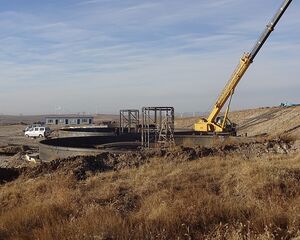GICON expands its involvement in the Chinese biogas market

New biogas plant for the treatment of animal waste is being built on the border with Mongolia
GICON is expanding its involvement in the Chinese bioenergy market and will provide extensive engineering services for a new plant in the far northeast of China. The biogas plant is part of the "Inner Mongolia Hope MengNeng Energy & Environmental Technology Company Biogas Project" and will process liquid manure and corn straw from surrounding pig farms. GICON will be responsible for the general planning and provide the client, Beijing XiTuoLianHe Environmental Engineering Co., Ltd., with German biogas plant expertise. This also includes basic engineering, detail engineering, construction supervision and commissioning of the plant in Ulanhot, China, which is scheduled for 2020. GICON engineers at the Dresden headquarters are working closely with the Chinese native speakers from the Shenzhen (China) branch of GAET (GICON Advanced Environmental Technologies GmbH), a company belonging to the GICON Group of companies, on the planning and design of the plant.
High requirements due to geographical location and climatic conditions
In total, the plant will have a capacity for processing around 1,200 tons of pig manure and up to 100 tons of corn straw per day. With these feedstocks, more than 15,000 Nm³ of biogas are to be produced per day, which corresponds per year to the gas consumption of slightly more than 1,000 German single family homes. The biogas produced is converted into natural gas in a treatment plant using the membrane separation process, which replaces the LPG (Liquefied Petroleum Gas) previously used in pig farms.
Due to its geographical location in the autonomous region "Inner Mongolia", the plant has to withstand large seasonal temperature fluctuations, as GICON Project Manager Thorsten Winkler explains. "In Ulanhot, long, cold winters of more than -30 degrees Celsius are the norm. In spring the temperatures rise relatively quickly and reach up to 40 degrees in the short summer. That's why we decided on a complex package of structural, technical and chemical measures," he explains when designing the plant. During winter operation, GICON engineers are primarily concerned with avoiding freezing of pipes. This can be done by a constant flow of water or by heating the pipes (when not in use). In addition, the viscosity of liquids must be kept as low as possible, because as it gets colder, the liquid becomes more viscous and difficult to handle. In addition, it is important to prevent the formation of ice in the system components, to avoid the failure of the electrical trace heating and to enable maintenance and repair work even under harsh winter conditions.
"Even simple measures can make a facility winterproof," explains Thorsten Winkler. "For example, we recommend installing as many units as possible in rooms that are already heated. However, the following applies: devices and pipes containing biogas should be reduced to a minimum for reasons of explosion protection. In addition, a combination of insulation and trace heating provides effective frost protection. Furthermore, the addition of glycol as an anti-freeze agent in the heating water system can have a supportive effect as its freezing point is below that of water." In general, GICON engineers recommend the use of natural slopes and drains for all water pipes in order to avoid dead zones and congestion.
Company merger and environmental protection in China
The provision of the above services is part of a merger signed in October 2018 between GICON and four other partners. The aim of the joint activities is to combine strengths and expertise in order to plan and advance bioenergy projects in China. The topics of environmental protection and sustainable management are becoming increasingly important in China and are supported by the government. This also includes measures to promote biogas technology in the treatment of animal waste.